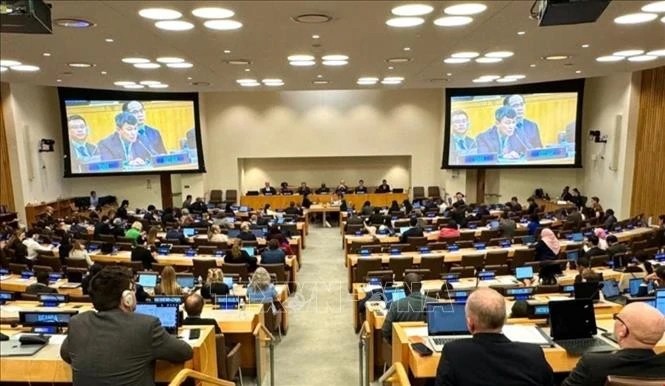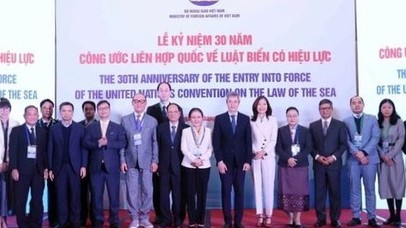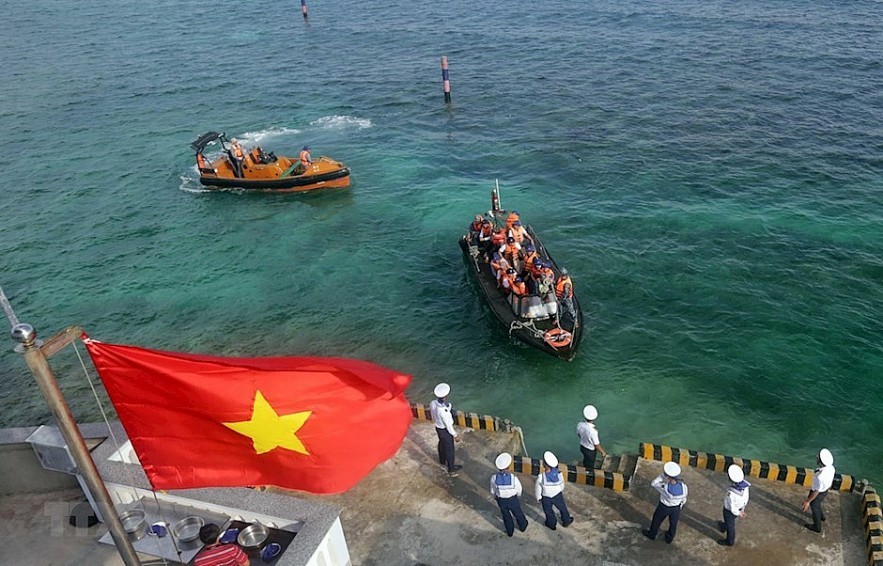Parties in the South China Sea Need to Show Goodwill and Cooperative Spirit
The Permanent Court of Arbitration (PCA) issued on July 12, 2016, in The Hague (Netherlands), stated an important ruling rejecting China's flawed claim on "historic rights" for the sea area within the so-called "nine-dash line", which covers 80% of the South China Sea.
It is the legal basis to assert that China's "nine-dash line" claim is flawed and contrary to the 1982 United Nations Convention on the Law of the Sea (UNCLOS 1982).
This is also an important milestone in efforts to settle disputes in the South China Sea by peaceful means, in accordance with international law, affirming the paramount role of international law in settling disputes in the South China Sea.
Important value of PCA ruling reaffirmed by international community
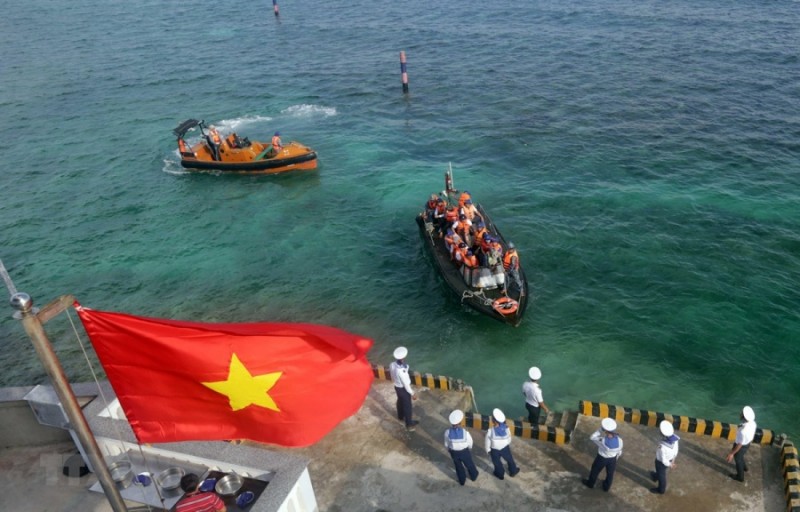 |
| Six years after establishment, the importance of the PCA ruling in particular and of UNCLOS 1982 in general in settling disputes in the South China Sea is still affirmed by the international community (Photo: VTV). |
The international community has welcomed the PCA's ruling since its establishment. At that time, United Nations Secretary-General Ban Ki-moon called on all parties to settle disputes in the South China Sea through dialogue and in compliance with international law.
The US stated that the PCA's ruling was "an important contribution to the common goal of peaceful resolution" of the disputed issues in the South China Sea, reported by VNA.
The European Council (EC) called on China to respect the international system, stressing that a "rules-based international order" would serve common interests and should be protected.
The Philippines affirmed that it respects the PCA ruling, considering it an important contribution to efforts to resolve disputes in the South China Sea.
In a statement on July 12, 2021, Japanese Foreign Minister Toshimitsu Motegi emphasized that "the ruling of PCA is final and legally binding on the parties involved in the dispute based on provisions of the UNCLOS 1982."
According to Motegi, all claims in the South China Sea should be based on the relevant provisions of UNCLOS, while reaffirming opposition to unilateral efforts to change the status quo in the area.
The US Secretary of State Antony Blinken, in a press release from the US State Department on July 11, 2021, also reiterated Washington's position that all Chinese claims in the South China Sea outside of internationally recognized waters are illegal.
The head of the US State Department noted that UNCLOS 1982 provides a legal framework for all activities in the seas and oceans, and affirms that a rules-based maritime order benefits not only parties of the South China Sea but also all countries in the world.
Canada's Ministry of Foreign Affairs also reaffirmed that "the PCA's ruling is a meaningful and useful legal basis for the peaceful settlement of disputes in the South China Sea," and stated that all relevant parties must abide by this decision.
Canada stated that it “supports the commercial, maritime and aviation rights, as well as the sovereign and jurisdictional rights of the countries bordering the South China Sea, as exercised in accordance with international law, including UNCLOS 1982.
At the second German-Australian ministerial political and security consultation in 2021, German Defense Minister Annegret Kramp-Karrenbauer and Australian counterpart Peter Dutton also emphasized the importance of freedom of navigation and overflight in the South China Sea, highlighting the central role of UNCLOS in resolving related issues.
According to the ministers, the PCA's 2016 ruling on disputes in the South China Sea is final and binding on all parties.
International press and experts call on the parties to comply with international rules and standards
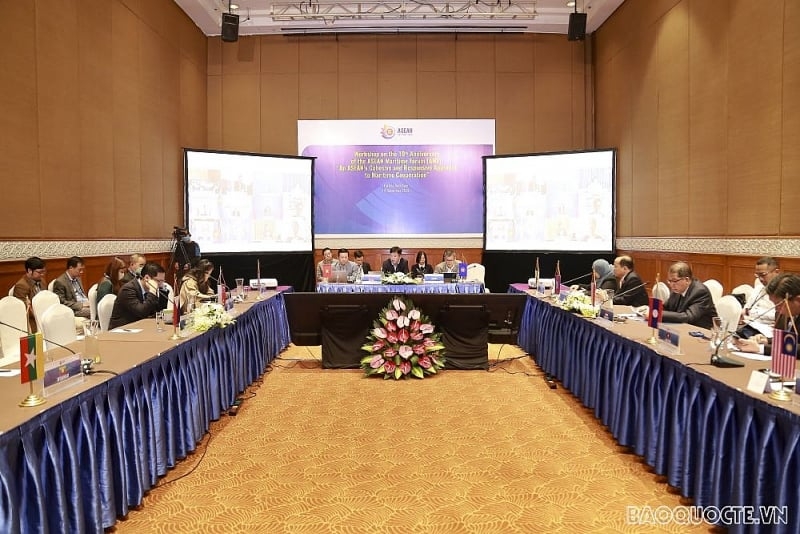 |
| At the workshop focusing on ASEAN's cohesive and responsive approach to maritime cooperation (Photo: baoquocte.vn). |
On the occasion of the 5th anniversary of the PCA ruling, the Malaysian online site Theinsnews.com emphasized that the establishment of the 1982 UNCLOS is the process of building an international order on the basis of law, in which the convention is an important legal document regaring the sovereignty, territorial sea and rights and obligations of a maritime state. This is the legal basis for coastal states to make maritime policies and develop corresponding legal documents.
European scholars Dr. Alexander Korolev and Dr. Irina Strelnikova of the Higher School of Economics (Russia), in the article “5 years of the Arbitral Tribunal's ruling on the South China Sea: The intersection of geopolitics and international law international law,” asserting that the PCA ruling has become an important milestone in the history of territorial disputes in the South China Sea and that international law has the ultimate role in resolving these disputes.
The authors emphasize that UNCLOS 1982 is the most legally binding for all signatories, as well as the role of the ruling made by the Arbitral Tribunal in 2016.
Expert Sergei Tolstov, Director of the Institute of Political Analysis and International Studies based in Kiev (Ukraine), highly appreciated the significance of PCA's ruling and international law in settling disputes in the South China Sea. He also highlighted the obligations of the parties to comply with UNCLOS and the PCA's ruling.
The Ukrainian expert also said that in the current context, a positive step is that the parties can discuss signing the Code of Conduct of Parties in the South China Sea (COC), which attaches importance to ensuring the maritime freedom of the parties.
Experts attending the fourth seminar on the South China Sea organized by the Asia-Africa Institute of the University of Hamburg in Germany in early July 2021 also highlighted the 1982 UNCLOS and the PCA's ruling in dispute settlement efforts in the South China Sea.
Professor Thomas Engelbert of the University of Hamburg said that the international community always upholds compliance with international law and strongly opposes actions that violate the 1982 UNCLOS and do not comply with the PCA's ruling.
Professor Suzette Suarez of the University of Applied Sciences Bremen stated that, according to international law and the PCA's ruling, the "nine-dash line" claim as well as other sovereignty claims that China claims in the South China Sea have no legal value.
However, there have been complicated developments in the South China Sea situation related to China's continuous unilateral activities that increase tensions in the area, such as conducting large-scale exercises and the Coast Guard Law took effect on February 1, 202, bringing more than 200 ships to operate in the Sinh Ton island cluster on the Spratly archipelago under Vietnam's sovereignty. The international community has expressed concern and repeatedly called on the parties to comply with international rules and standards, especially UNCLOS 1982.
At the 31st Conference of States Parties to UNCLOS, which took place at the United Nations Headquarters in New York (USA), Ambassador Dang Dinh Quy, Vietnam's Permanent Mission to the UN, stated: It is clear that the South China Sea is an important international maritime route, maintaining its peace, security, stability, safety, and freedom of navigation is essential to the peace and development of the region and of the world.
The Ambassador reaffirmed Vietnam's position that all disputes must be resolved through peaceful means, on the basis of respect for international diplomatic and legal processes, including the United Nations Charter and UNCLOS 1982, without the use of force or the threat of force.
In the current context, to ensure the principle of rule of law in the South China Sea, first of all, relevant parties need to fully implement the Declaration on the Conduct of Parties in the South China Sea (DOC) and soon complete the COC that has substantive and effective content, consistent with international law, including UNCLOS 1982.
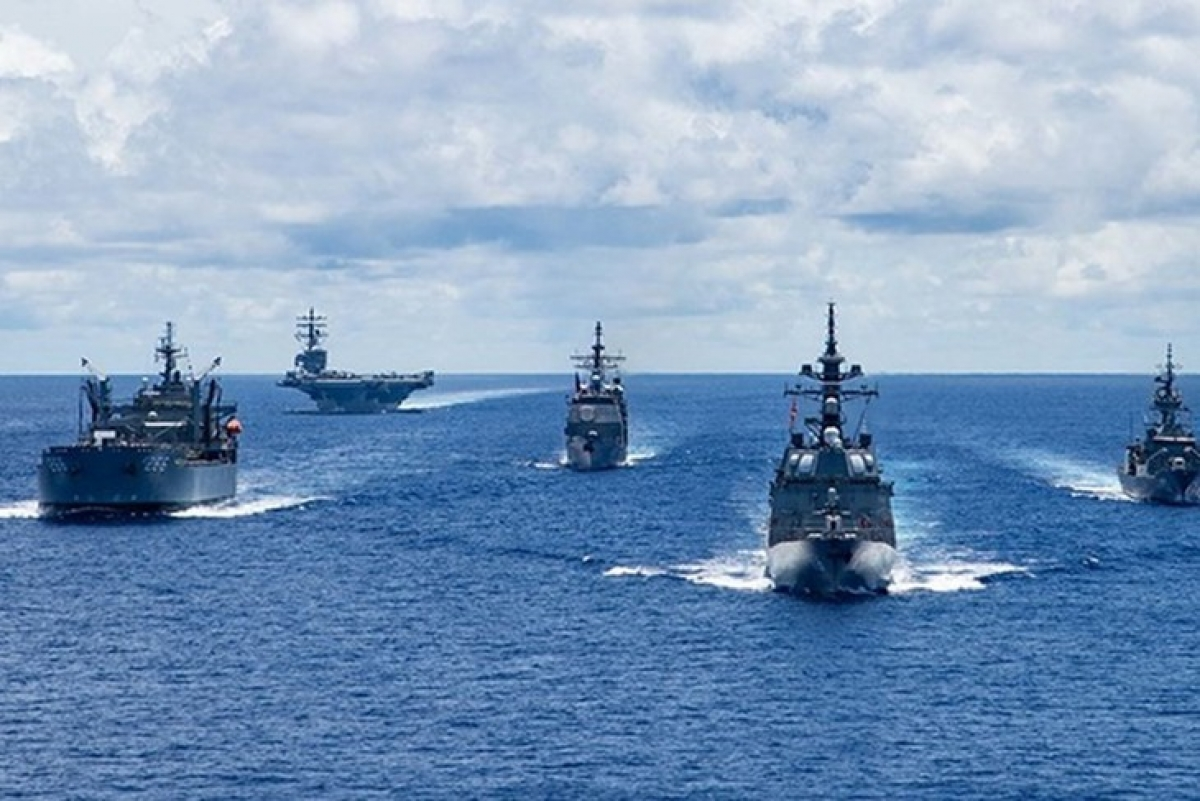 | South China Sea (Bien Dong Sea): battle of diplomatic notes and law-abiding spirit China's ongoing campaign in the South China Sea (known in Vietnam as Bien Dong Sea) - the vital waterway, in spite of the COVID-29 pandemic, ... |
 | Vietnamese Youths in Russia Showcase Talents and Innovative Spirit Various art performances of Vietnamese youths in Russia have been staged at the Peoples' Friendship University of Russia. |
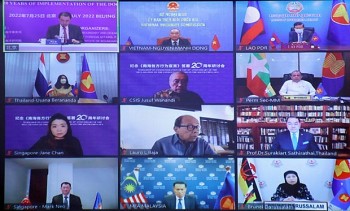 | DOC Promotes Peace, Trust, Cooperation between ASEAN, China The Declaration of the Conduct of Parties in the South China Sea (DOC) has contributed to promoting peace, trust and cooperation between the Association of ... |
In topics
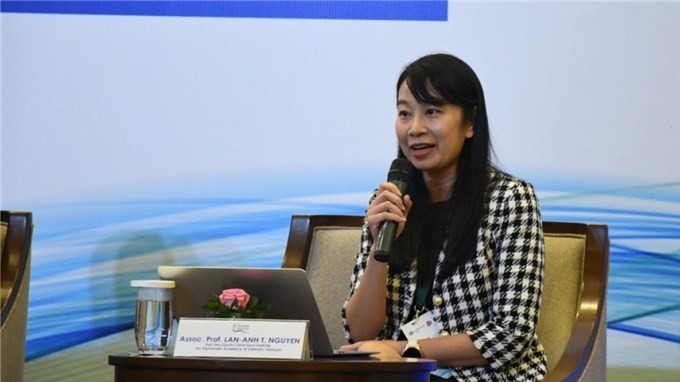 Focus
Focus
Vietnam - Responsible Member of 1982 UNCLOS - DAV’s Director of South China Sea Institute
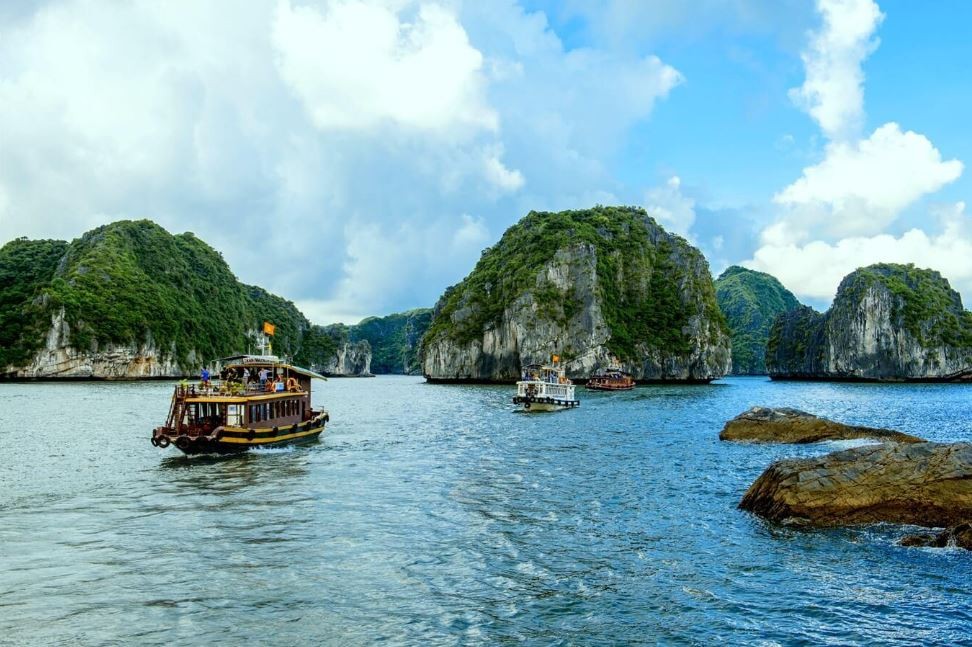 Seas and islands
Seas and islands
Vietnam Respects and Upholds universal value of UN Convention on the Law of the Sea
Recommended
 Seas and islands
Seas and islands
Vietnam Endorses Common Voice on Ocean Jurisdiction
 Seas and islands
Seas and islands
Dialogue as Key to Settling Disputes and Advancing Law of the Sea
 Seas and islands
Seas and islands
RoK Navy Ship Pays Friendly Visit to Da Nang City
 Seas and islands
Seas and islands
Naval Region 5 Promotes Reading Culture, Fosters Patriotism
Popular article
 Seas and islands
Seas and islands
Coast Guard Region 2 Command Hosts Philippine Coast Counterpart
 Seas and islands
Seas and islands
Vietnam - Thailand Navy: Coordination to Well Address Problems at Sea
 Seas and islands
Seas and islands
Honoring the Fallen: Incense Offering for the 37th Anniversary of Gac Ma
 Seas and islands
Seas and islands




